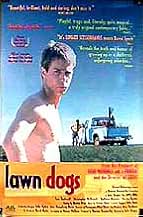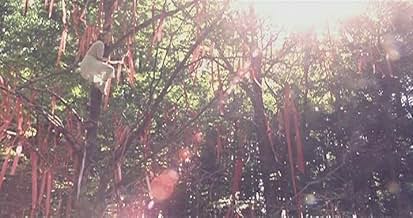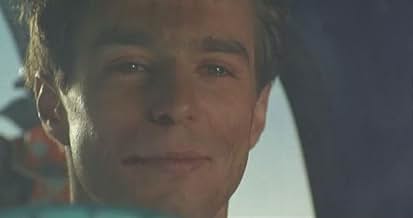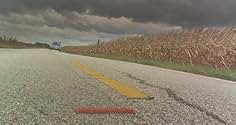IMDb रेटिंग
7.4/10
9.1 हज़ार
आपकी रेटिंग
अपनी भाषा में प्लॉट जोड़ेंWhen Devon, a 10-year-old girl, forges a friendship with Trent, a 21-year-old outsider who mows the neighborhood lawns, things suddenly get very complicated and private.When Devon, a 10-year-old girl, forges a friendship with Trent, a 21-year-old outsider who mows the neighborhood lawns, things suddenly get very complicated and private.When Devon, a 10-year-old girl, forges a friendship with Trent, a 21-year-old outsider who mows the neighborhood lawns, things suddenly get very complicated and private.
- पुरस्कार
- 7 जीत और कुल 4 नामांकन
John Bacon
- Neighbor at Barbecue
- (बिना क्रेडिट के)
Khris Colgate
- Neighbor at Barbecue
- (बिना क्रेडिट के)
फ़ीचर्ड समीक्षाएं
LAWN DOGS
Aspect ratio: 1.85:1
Sound format: Dolby Digital
The haves and have-nots are put under the microscope in John Duigan's diverting drama LAWN DOGS, and it's the haves who come up wanting in every respect. Sam Rockwell (CONFESSIONS OF A DANGEROUS MIND) is the penniless gardener-cum-handyman who makes a fragile living tending the lawns of contemptuous rich folk, all of whom view him with deep suspicion whilst indulging their own dubious peccadilloes behind closed doors. Mischa Barton (THE SIXTH SENSE, TV's "The O.C.") is a lonely 10 year old girl who's been shielded from the world by her wealthy parents following a recent health scare (she has a faulty heart), but she dares to strike up a friendship with Rockwell after stumbling onto his ramshackle home in the woods, a friendship which she pursues against Rockwell's wishes, until their 'secret' is forced into the open and grossly misinterpreted by Barton's vengeful family.
While the moneyed set lives in antiseptic splendour and conceals its hypocrisy behind security measures of every description, Rockwell's character enjoys an open life in a beautiful forest environment, like the witch Baba Yaga in Barton's favourite fairy tale. In fact, there's a magical, otherworldly quality to much of the film (rendered explicit in the final reel), though the central narrative is fairly low-key and revolves around Rockwell's frequent encounters with the dissolute low-lifes who dare to think themselves superior. With his wiry frame and white trash southern accent, Rockwell strikes something of a romantic figure (watch out for his full-frontal nude scene early in the film), though he never stoops to eccentricity or excess. For one so young, Barton is excellent in such a demanding role, and she holds her own against an experienced adult cast (including Christopher McDonald and Kathleen Quinlan as Barton's narrow-minded parents, and Eric Mabius as the rich jock who can barely conceal his attraction to Rockwell). Beautiful cinematography by Elliot Davis (KING OF THE HILL).
Aspect ratio: 1.85:1
Sound format: Dolby Digital
The haves and have-nots are put under the microscope in John Duigan's diverting drama LAWN DOGS, and it's the haves who come up wanting in every respect. Sam Rockwell (CONFESSIONS OF A DANGEROUS MIND) is the penniless gardener-cum-handyman who makes a fragile living tending the lawns of contemptuous rich folk, all of whom view him with deep suspicion whilst indulging their own dubious peccadilloes behind closed doors. Mischa Barton (THE SIXTH SENSE, TV's "The O.C.") is a lonely 10 year old girl who's been shielded from the world by her wealthy parents following a recent health scare (she has a faulty heart), but she dares to strike up a friendship with Rockwell after stumbling onto his ramshackle home in the woods, a friendship which she pursues against Rockwell's wishes, until their 'secret' is forced into the open and grossly misinterpreted by Barton's vengeful family.
While the moneyed set lives in antiseptic splendour and conceals its hypocrisy behind security measures of every description, Rockwell's character enjoys an open life in a beautiful forest environment, like the witch Baba Yaga in Barton's favourite fairy tale. In fact, there's a magical, otherworldly quality to much of the film (rendered explicit in the final reel), though the central narrative is fairly low-key and revolves around Rockwell's frequent encounters with the dissolute low-lifes who dare to think themselves superior. With his wiry frame and white trash southern accent, Rockwell strikes something of a romantic figure (watch out for his full-frontal nude scene early in the film), though he never stoops to eccentricity or excess. For one so young, Barton is excellent in such a demanding role, and she holds her own against an experienced adult cast (including Christopher McDonald and Kathleen Quinlan as Barton's narrow-minded parents, and Eric Mabius as the rich jock who can barely conceal his attraction to Rockwell). Beautiful cinematography by Elliot Davis (KING OF THE HILL).
Trent is a young man living in a trailer in a wooded area beyond the suburbs. He makes a living cutting the massive lawns of the populace of a gated suburb village. He befriends a young girl from within the suburb, who herself has some stability issues, despite being only 10 years old. The two build a friendship despite the resentment towards the `white trash' Trent from within the suburb,
I didn't know what this film was about before I sat and watched it, reading the plot summary in the tv guide as the title sequence began, I wondered if I would bother, but I'm glad I did. The film works on several level the most apparent of which is the simple story of a friendship that is threatened. This part works well as the friendship never seems forced and, although the spectre of sexual tension is there (in Trent occasionally feeling uncomfortable), it is not a strand that is actually part of their relationship.
This all works well due (in most part) to two great performances from Barton and Rockwell. Barton shows amazing maturity and ability to carry the role off without it being like many child stars (where it is clear they are forcing everything). Rockwell meanwhile is a mass of subtleties and little touches that make his character likeable.
However this part wouldn't work as well if it weren't for the wider theme of the trash being poorly treated by the smugger middle classes. This theme creates the reason for the threat to their friendship (more or less) but it also serves as a humbling attack on a class that lives a selfish, scared life behind gates with private security guards. Such places are increasingly common in America and this film is clear as to their effect on both those inside them as well as the wider community of America. Although it keeps a gentle tone for the most, the film depicts those in the suburb as selfish, aloof and fearful. Even more condemning about this depiction is that it never feels like they have been exaggerated or monsterised in any way!
The script is well written and certainly makes the actors jobs a lot easier certainly Barton benefits from great dialogue and character development. Rockwell meanwhile benefits more from direction as much of his best work is not dialogue based. McDonald, Quinlan and McGill all do solid work in support. The end of the film is a little worrying as it appears to veer off at a tangent, but the final sentiment is beautifully presented and encouraging (albeit due to a child's apparent naivety).
Overall this is a lovely film that I'm very glad I watched. About more than just an adult/child friendship, this film is moving and involving in both it's core plot and it's wider themes.
I didn't know what this film was about before I sat and watched it, reading the plot summary in the tv guide as the title sequence began, I wondered if I would bother, but I'm glad I did. The film works on several level the most apparent of which is the simple story of a friendship that is threatened. This part works well as the friendship never seems forced and, although the spectre of sexual tension is there (in Trent occasionally feeling uncomfortable), it is not a strand that is actually part of their relationship.
This all works well due (in most part) to two great performances from Barton and Rockwell. Barton shows amazing maturity and ability to carry the role off without it being like many child stars (where it is clear they are forcing everything). Rockwell meanwhile is a mass of subtleties and little touches that make his character likeable.
However this part wouldn't work as well if it weren't for the wider theme of the trash being poorly treated by the smugger middle classes. This theme creates the reason for the threat to their friendship (more or less) but it also serves as a humbling attack on a class that lives a selfish, scared life behind gates with private security guards. Such places are increasingly common in America and this film is clear as to their effect on both those inside them as well as the wider community of America. Although it keeps a gentle tone for the most, the film depicts those in the suburb as selfish, aloof and fearful. Even more condemning about this depiction is that it never feels like they have been exaggerated or monsterised in any way!
The script is well written and certainly makes the actors jobs a lot easier certainly Barton benefits from great dialogue and character development. Rockwell meanwhile benefits more from direction as much of his best work is not dialogue based. McDonald, Quinlan and McGill all do solid work in support. The end of the film is a little worrying as it appears to veer off at a tangent, but the final sentiment is beautifully presented and encouraging (albeit due to a child's apparent naivety).
Overall this is a lovely film that I'm very glad I watched. About more than just an adult/child friendship, this film is moving and involving in both it's core plot and it's wider themes.
I am baptized in the blood, `bathtubs full,' of wild dogs, chicken dinners, and a little fairy princess. Last night I viewed "Lawn Dogs" for the second time in 5 days. I just couldn't return the tape without another look-see, even if it makes Block Buster $2 richer and me $2 poorer, for the awareness and inspiration this fairy-tale masterpiece has imbued me with are priceless. Like Trent in the film, I am alive with the hope that flight from any kind of poverty, financial or spiritual, is possible.
On the surface, the story seems to revolve around the relationship between a young man, Trent, and a little girl, Devon, and between the two struggling economic classes that they come from. But the magical cinematography throughout the film, and more than that, Devon's running fairy-tale narration, allude to a deeper meaning in the film that is revealed absolutely in the last five minutes. After all, there is nothing in the world around us that is not represented by symbols within us, and how can we tell whether the inner symbols we deal with represent things outside us, or things within us? It is natural for the world to discourage a relationship between a sexually-active male, and a prepubescent, vulnerable, hungry-for-friends female. It is also natural for the world to discourage an individual from relating to the power within himself, perhaps represented by said young female, to imagine and pursue a better life for himself, when it means he will flee the status quo that makes the rest of the world comfortable.
The setting is a highly artificial, unabashedly bourgeois, gated community in Kentucky, `Camelot Gardens' (see, we're already alluding to fairy tales), and the surrounding countryside, wherein Trent lives in a trailer, making, what can loosely be called, a "living" by mowing the lawns of the rich in Camelot Gardens. The two heroes first meet when Devon happens upon Trent's trailer while wandering into the woods to sell cookies (her capitalist parents' idea), reciting to herself a version of the Russian fairy-tale about the contest between a little girl, like herself, and the witch named `Baba Yaga.' She continues her relationship with the at-first-reluctant Trent, as he continues to mow her parents' lawn. Whom she identifies Baba Yaga with, that is, who is evil in the world, evolves with the story. In the end, she realizes where the true evil lies, and uses the magic charms of her youthful idealism to aid the flight of the oppressed.
I really enjoyed this film. It not only inspires hope, but also possesses a depth sorely lacking in the majority of American films. Much of the symbolism in the story seems to be lifted directly from classical mythology: From the open nakedness of both heroes in the beginning, a necessary reduction of the self to its bare essentials before it can be remade into something new, Trent holding up traffic to dive naked from a one-lane bridge into the local river, a kind of spectacular baptism into a new beginning, and Devon removing her nightgown to bay from her rooftop, like some essential mythic beast imploring the gods of night; to the adorning, i.e. honoring, of the tree outside the door of Trent's trailer, the Sacred Tree, Ygdrasil, the Tree of Life, so honoring life itself, and the demands that life makes of us; to the maenadic frenzy of the dancing chicken feet, a maddening after-chicken-death/chicken-dinner dithyramb; to Trent's conquest over the infernal hound, a Doberman named `Tracker,' who guards the homes of Camelot Gardens, and perhaps guards as well the path to personal power, the hound who, like Cerberus, turns away all cowards (chickens) from the inner realms; to the magic towel and comb of divine deliverance (more on these two symbols below) at the end; the story is full of age-old symbols that affect us deeply, transforming us or renewing us, without our knowing how.
The following passage is taken from Marie-Louise von Franz's `Interpretation of Fairy Tales.' It will help the reader to understand the meaning of the magic comb and towel. (In von Franz's story, a red handkerchief substitutes for the towel.)
Says von Franz:
The girl runs, throwing her magic comb and her red handkerchief behind her. Bestrewing one's trail with objects is characteristic of the magic flight. This act of throwing away things of value is a sacrifice; one throws things over one's shoulder to the dead, or to spirits, or to the devil, to propitiate those whom we dare not face. It may seem panicky to abandon valuable possessions when one is escaping, but one who stiffens himself into a defensive attitude is easily cut down by an assailant stronger than himself, whereas stripping oneself gives mobility. There are situations in which one absolutely has to give up wanting anything, and in this way one slips out from under; one is not there any longer, so nothing more can go wrong. When one is confronted by a hopelessly wrong situation, one must just make a drastic leap to the bottom of passive simplicity, and from there one can live it out.
What is more, the objects which have been sacrificed generally transform themselves into obstacles for the pursuer. The comb at once turns into a forest and becomes a part of nature the hair of mother earth. Its transformation into a natural object suggests that originally it was an integral part of nature. Actually, there is no thought or instrument or object that has not originated from nature; that is, from the unconscious psyche. One sacrifices to the unconscious what once was wrested from it.
The comb is used to arrange and confine the hair. Hair is a source of magic power or mana. Ringlets of hair, preserved as keepsakes, are believed to connect one individual with another over a distance. Cutting the hair and sacrificing it often means submission to a new collective state a giving up and a rebirth. The coiffure is frequently an expression of a cultural Weltanschauung. Primitive folk tales speak of demons being deloused and combed when they are caught, which means that the confusion in the unconscious has to be straightened out, ordered, and made conscious. Because of this meaning, hair in wild disarray is often dreamed of at the start of an analysis. The comb, therefore, represents a capacity for making one's thoughts ordered, clear, and conscious.
The red handkerchief that the girl gives up becomes a flame soaring from earth to heaven. To abandon the staff and comb meant not attempting to marshal herself or to think out a plan. Now the flame indicates that she puts an inner distance between herself and her feelings and emotions. She is reduced to a passive simplicity.
In the tale, the gaping jaws devour the forest and spit water on the flame. Water and fire battle in the unconscious, and in the meantime the girl escapes between the opposites.
On the surface, the story seems to revolve around the relationship between a young man, Trent, and a little girl, Devon, and between the two struggling economic classes that they come from. But the magical cinematography throughout the film, and more than that, Devon's running fairy-tale narration, allude to a deeper meaning in the film that is revealed absolutely in the last five minutes. After all, there is nothing in the world around us that is not represented by symbols within us, and how can we tell whether the inner symbols we deal with represent things outside us, or things within us? It is natural for the world to discourage a relationship between a sexually-active male, and a prepubescent, vulnerable, hungry-for-friends female. It is also natural for the world to discourage an individual from relating to the power within himself, perhaps represented by said young female, to imagine and pursue a better life for himself, when it means he will flee the status quo that makes the rest of the world comfortable.
The setting is a highly artificial, unabashedly bourgeois, gated community in Kentucky, `Camelot Gardens' (see, we're already alluding to fairy tales), and the surrounding countryside, wherein Trent lives in a trailer, making, what can loosely be called, a "living" by mowing the lawns of the rich in Camelot Gardens. The two heroes first meet when Devon happens upon Trent's trailer while wandering into the woods to sell cookies (her capitalist parents' idea), reciting to herself a version of the Russian fairy-tale about the contest between a little girl, like herself, and the witch named `Baba Yaga.' She continues her relationship with the at-first-reluctant Trent, as he continues to mow her parents' lawn. Whom she identifies Baba Yaga with, that is, who is evil in the world, evolves with the story. In the end, she realizes where the true evil lies, and uses the magic charms of her youthful idealism to aid the flight of the oppressed.
I really enjoyed this film. It not only inspires hope, but also possesses a depth sorely lacking in the majority of American films. Much of the symbolism in the story seems to be lifted directly from classical mythology: From the open nakedness of both heroes in the beginning, a necessary reduction of the self to its bare essentials before it can be remade into something new, Trent holding up traffic to dive naked from a one-lane bridge into the local river, a kind of spectacular baptism into a new beginning, and Devon removing her nightgown to bay from her rooftop, like some essential mythic beast imploring the gods of night; to the adorning, i.e. honoring, of the tree outside the door of Trent's trailer, the Sacred Tree, Ygdrasil, the Tree of Life, so honoring life itself, and the demands that life makes of us; to the maenadic frenzy of the dancing chicken feet, a maddening after-chicken-death/chicken-dinner dithyramb; to Trent's conquest over the infernal hound, a Doberman named `Tracker,' who guards the homes of Camelot Gardens, and perhaps guards as well the path to personal power, the hound who, like Cerberus, turns away all cowards (chickens) from the inner realms; to the magic towel and comb of divine deliverance (more on these two symbols below) at the end; the story is full of age-old symbols that affect us deeply, transforming us or renewing us, without our knowing how.
The following passage is taken from Marie-Louise von Franz's `Interpretation of Fairy Tales.' It will help the reader to understand the meaning of the magic comb and towel. (In von Franz's story, a red handkerchief substitutes for the towel.)
Says von Franz:
The girl runs, throwing her magic comb and her red handkerchief behind her. Bestrewing one's trail with objects is characteristic of the magic flight. This act of throwing away things of value is a sacrifice; one throws things over one's shoulder to the dead, or to spirits, or to the devil, to propitiate those whom we dare not face. It may seem panicky to abandon valuable possessions when one is escaping, but one who stiffens himself into a defensive attitude is easily cut down by an assailant stronger than himself, whereas stripping oneself gives mobility. There are situations in which one absolutely has to give up wanting anything, and in this way one slips out from under; one is not there any longer, so nothing more can go wrong. When one is confronted by a hopelessly wrong situation, one must just make a drastic leap to the bottom of passive simplicity, and from there one can live it out.
What is more, the objects which have been sacrificed generally transform themselves into obstacles for the pursuer. The comb at once turns into a forest and becomes a part of nature the hair of mother earth. Its transformation into a natural object suggests that originally it was an integral part of nature. Actually, there is no thought or instrument or object that has not originated from nature; that is, from the unconscious psyche. One sacrifices to the unconscious what once was wrested from it.
The comb is used to arrange and confine the hair. Hair is a source of magic power or mana. Ringlets of hair, preserved as keepsakes, are believed to connect one individual with another over a distance. Cutting the hair and sacrificing it often means submission to a new collective state a giving up and a rebirth. The coiffure is frequently an expression of a cultural Weltanschauung. Primitive folk tales speak of demons being deloused and combed when they are caught, which means that the confusion in the unconscious has to be straightened out, ordered, and made conscious. Because of this meaning, hair in wild disarray is often dreamed of at the start of an analysis. The comb, therefore, represents a capacity for making one's thoughts ordered, clear, and conscious.
The red handkerchief that the girl gives up becomes a flame soaring from earth to heaven. To abandon the staff and comb meant not attempting to marshal herself or to think out a plan. Now the flame indicates that she puts an inner distance between herself and her feelings and emotions. She is reduced to a passive simplicity.
In the tale, the gaping jaws devour the forest and spit water on the flame. Water and fire battle in the unconscious, and in the meantime the girl escapes between the opposites.
This is the kind of movie that independent film fans search for and hope to find. It's well-written, acted and directed with a story that's off the beaten path a bit, to be sure. It concerns the odd relationship between two people who don't exactly fit in the world an upscale suburban housing community. One is a 10 -year old girl named Devon (Mischa Barton) whose parents want her to be the perfect little daughter. She'd rather live in her own world, one in which she entertains herself with her favorite fairy tale of the child-menacing witch, Baba Yaga. The other is a twentysomething yard worker named Trent (Sam Rockwell), who is treated in this paranoid community almost like a black South African under apartheid, i.e. get in, do you work and get out.
Both of them display their non-conformist behavior early on. She climbs out her bedroom window to her roof, takes off her nightgown and watches it magically float away into the night sky. He stops on his way home from work on a one-lane bridge, blocking the traffic, and proceeds to disrobe and take a leap into the river below. Devon gets interested in him, especially after she witnesses his blatant and subtle humiliation at a neighborhood cookout, where he's come to get paid for some work. She more or less stalks him at his mobile home, even spying on him making love to one of the community's young women, a girl who will barely acknowledge him otherwise. Trent tries to shoo Devon away at first, but he can't help but be flattered by the young girl's interest.
Of course the potential for misunderstanding in this kind of relationship is great and it inevitably happens. I feared that the movie was about to fly apart after Devon's father and some others confronted Trent, but the fantastic ending (fantastic in the sense of fantasy) made me smile. If you are looking for something different, this movie definitely qualifies.
Both of them display their non-conformist behavior early on. She climbs out her bedroom window to her roof, takes off her nightgown and watches it magically float away into the night sky. He stops on his way home from work on a one-lane bridge, blocking the traffic, and proceeds to disrobe and take a leap into the river below. Devon gets interested in him, especially after she witnesses his blatant and subtle humiliation at a neighborhood cookout, where he's come to get paid for some work. She more or less stalks him at his mobile home, even spying on him making love to one of the community's young women, a girl who will barely acknowledge him otherwise. Trent tries to shoo Devon away at first, but he can't help but be flattered by the young girl's interest.
Of course the potential for misunderstanding in this kind of relationship is great and it inevitably happens. I feared that the movie was about to fly apart after Devon's father and some others confronted Trent, but the fantastic ending (fantastic in the sense of fantasy) made me smile. If you are looking for something different, this movie definitely qualifies.
Sam Rockwell has been had. He lit up the screen in "Box of Moonlight," is a major player in the upcoming "Midsummer Night's Dream," and yet he didn't get equal billing for screen time in either of those films. What gives? In "Lawn Dogs" Rockwell is stunning as the lawn boy who accepts a little "rich" girl as a friend and gives her a new view of the world. The movie is rich in atmosphere and color. The central Southern United States has rarely appeared so docile and yet so menacing. Every time I thought I knew where "Lawn Dogs" was going...it pulled another pleasant surprise. Mischa Barton is amazing as Devon Stockard, the little girl with more on her mind than selling cookies. This is truly one of the best American films of the 90's. If you like off-beat slices of America with a twisted view, then "Lawn Dogs" is the best movie you'll see in a long time. It is quite simply full of the magic, menace and imagination alive in the heads and hearts of little girls...about to become young women. Oh yeah, and give Sam Rockwell his due!
क्या आपको पता है
- ट्रिवियाRandy Peterson, the stuntman who doubled for Sam Rockwell in the dive off the bridge early in the film, performed the stunt a total of six times - five times completely naked, and once wearing briefs (in case an alternative shot would be needed for a US TV version). The bridge (in Louisville, Kentucky, USA) was 30 feet high and the water around nine feet deep.
- गूफ़When Devon pours a glass of water for Trent it is less than half full. In the next scene outside it is seen to be more than half full even after splashing it about.
- इसके अलावा अन्य वर्जनFor showing on US television, all of the profanity was dubbed over with less extreme words, the sex scene between Trent and Pam (at around 20 minutes in) used an alternate take where they are wearing clothes as opposed to them being nude in the original, and the scene where Trent dives off the bridge completely naked (at around 10 minutes in) used an alternate take with him (actually a stunt man) wearing underwear. The alternate takes were filmed with the intention of this being shown on TV in the US. The version streaming on several internet services (Amazon, Tubi, etc.) is this censored TV version.
- कनेक्शनReferenced in Jersey Girl (2004)
- साउंडट्रैकShake And Shiver
Performed by Jubilee
Courtesy of Silvertone Records, Ltd.
Written by Ross Baxter, Chris Holditch, Garron Firth and Lee Severin (as Baxter/Frith/Holdich/Severin
Used by permission of Zomba Music Publishers Ltd.
टॉप पसंद
रेटिंग देने के लिए साइन-इन करें और वैयक्तिकृत सुझावों के लिए वॉचलिस्ट करें
- How long is Lawn Dogs?Alexa द्वारा संचालित
विवरण
बॉक्स ऑफ़िस
- बजट
- $80,00,000(अनुमानित)
- US और कनाडा में सकल
- $1,06,404
- US और कनाडा में पहले सप्ताह में कुल कमाई
- $22,491
- 17 मई 1998
- दुनिया भर में सकल
- $1,06,404
- चलने की अवधि
- 1 घं 41 मि(101 min)
- ध्वनि मिश्रण
- पक्ष अनुपात
- 1.85 : 1
इस पेज में योगदान दें
किसी बदलाव का सुझाव दें या अनुपलब्ध कॉन्टेंट जोड़ें



















